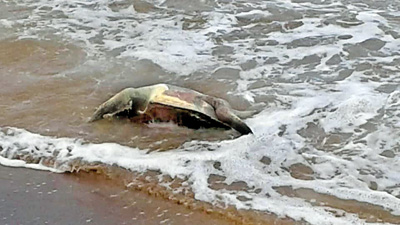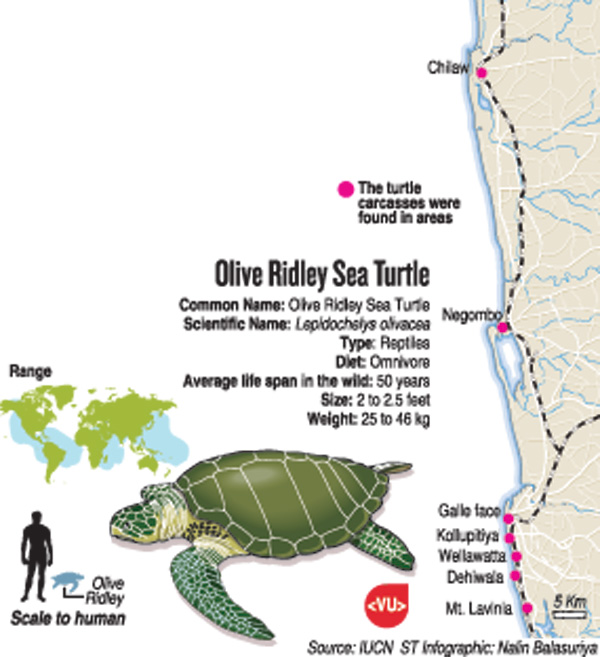News
Multiple bodies of sea creatures appear on beaches, worrying scientists
Researchers are puzzling over the appearance of decaying carcasses of almost 20 turtles and four porpoises washed ashore over several days this week, and there is speculation that the recent oil spill could have caused the deaths.

A turtle carcass washed ashore in Chilaw
Veterinary surgeons of the Department of Wildlife Conservation (DWC) have conducted postmortems but are as yet unable to ascertain the cause of death of such a large number of sea creatures as the bodies are in an advanced state of decomposition.
The DWC veterinary surgeon in charge of the Western Province, Dr Suhada Jayawardena, said the sea turtles, more than 17 in number, were of the species Olive ridley (Lepidochelys olivacea).
The turtle carcasses were found at Galle Face, Mount Lavinia, Kollupitiya, Wellawatte, Dehiwela, Chilaw and Negombo. Most of the bodies were quickly buried by coastguards as they were badly decomposed.
“We carried out postmortems of three turtles; they were all adult females and had no signs of external injuries or other abnormalities apart from the rapid decomposition. The bodies have at least floated at sea for three to four days,” Dr. Jayawardena said.
He said the turtles had eaten recently as there were food remains in their stomachs. “We collected samples from internal organs and sent them to the Veterinary Investigation Centre in Homagama, which operates under the Department of Animal Production and Health,” Dr. Jayawardena said.
The veterinary surgeon attached to the Dehiwela Zoo, Dr. Dinuka Sonnadaran, said her team had conducted postmortems on five turtles washed up at Mount Lavinia and had collected tissue samples for analysis.
“It was difficult for us to even identify the turtles as the carcasses have decayed in the sea for several days. Some turtles did not even have the keratin outer layer of their shells. However, we identified them as Olive ridley turtles,” she said.
The four porpoises found dead were washed ashore in the Arugam Bay area, DWC vet Dr. Sameera Suranjith said. They were sub-adult Indo-Pacific finless porpoises (a small whale species), about 52 inches (1.3m) long.
“From the postmortems we learned the animals had squid and prawns in their guts. We were unable to detect wounds or any other changes as the carcasses had perished,” Dr. Suranjith said. Tissue samples have been sent to the Veterinary Investigation Centre in Peradeniya.
Marine Environment Protection Authority (MEPA) senior officials said more analysis needed to be carried out before jumping to conclusions but, MEPA Assistant Manager Karasu Sripathi said, the oil spill from the MT New Diamond supertanker, which caught fire in Sri Lanka’s eastern waters on September 3, could have been a factor in the deaths. Chemical oil dispersants were seen in the water afterwards, and the use of these is controversial.
“We cannot speculate that recent incidents such as oil seeping from a tanker caused harm to animals,” National Aquatic Resources Research and Development Authority (NARA) Director-General L.K.T.C Lokukumara said.
“If the reports confirm that the sea creatures were affected by such a cause, we would take necessary action.” NARA plans to release a report in a week when analysis results were all in.

